Many RVs have a degree of off-road capability. They can conquer certain terrains, but some paths become too difficult to cross. If you’re looking for an RV that’s easy to take with you, no matter where you go, consider a truck camper.
The truck camper has evolved through the years, making it the best camper for people on the move in the roughest environments. We’ll show you the many benefits that RVers look for when they choose this category of coach. You’ll also learn the realities and limitations that make others look at other types. If you are interested, we’ll highlight the features to expect.
Key Points
- Truck campers use payload capacity and bed length
- Independent manufacturers dominate the truck camper market
- Many of the truck camper builders allow customers to customize their units
- Millennials are choosing truck campers as an alternative to campervans
- Pop-up camper technology came from soft-shell truck camper innovation
What is a Truck Camper
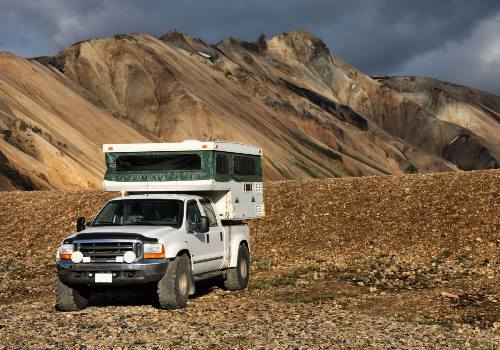
A truck camper is an RV mounted inside a pickup truck’s bed in the simplest terms. The RV is known for its cabover loft section that resides above the truck’s cab, but some models don’t have this feature.
The weight and measurement factors differ from the other RV categories. Instead of towing capacity, truck campers use a truck’s payload capacity. What a truck can hold within its bed and tow are entirely different from each other.
The length of the truck’s bed directly affects truck campers too. These RVs come in either short bed or long bed versions. For perspective, there are three pickup truck bed sizes:
| TYPE | LENGTH |
| Short bed | 5.5 feet long |
| Standard bed | 6.5 feet long |
| Long bed | 8 feet long |
Most manufacturers design their truck campers for short bed or long bed trucks. Standard beds can go either way depending on where the center of gravity (the point where the camper’s weight is primarily balanced) is on the truck camper. If that point sits within the bed correctly, the camper will work for your truck.
The camper has an aluminum frame with a corrugated aluminum or fiberglass panel shell. The interior features use the same major components you’d see in a travel trailer. Cabinetry uses lumber core or other plywood alternatives for strength, and hardwood cabinet doors finish the look.
Many truck campers have holding tanks, house batteries, and are prewired for alternative electrical sourcing, making dry camping possible. Most units are perfect for 2-3 people, but bigger versions can sleep 4-5.
History of Truck Campers
As pickup trucks became popular family vehicles in the 1950s, truck campers came on the RV scene. They served as extra seating for the kids and as a weekend camper for American families. Early models were the non-cabover versions that were fancy truck caps. When camping, you could string up cots to sleep. You’d also take advantage of W.C. Coleman’s new cooler, two-burner stove, and classic lantern.
As the technology evolved and its popularity rose, truck campers gain all the features needed for on-the-road living. Many manufacturers took advantage of the space above the driver cab by adding the bed space above it.
During the Second World War, the Alaska-Canada Highway (known as the Alcan Highway) began construction. When it opened in 1948 to the public, Americans now had a direct route from the lower 48 states to the Territory of Alaska (Alaska didn’t join the union until January 3, 1959). The road is windy, cold, and rough even today though it’s now completely paved.
Alaskan Campers opened its doors in 1953 with a truck camper explicitly designed to traverse the Alcan Highway. The hardshell noncabover camper could raise and lower its roof making it optimal for the conditions. When lowered, the top was flush with the driver cab. When it was time to pull over, owners could raise the roof to stand straight up inside the unit.
From the 1950s to the 1970s, various RV companies would play around with truck camper designs. Through customer feedback (mostly sales results), the cabover and noncabover slide-in versions that could fit within the truck’s bed became the most sought after designs.
One of the most significant technology additions to the truck camper came in 1972 from David Rowe. His soft-shell pop-up roof allowed cabover campers the ability to minimize their height, making them easier to travel. It lowered the top-heaviness and made the unit more aerodynamic. Rowe eventually joined Four Wheel Campers to lead the category.
Alaskan Camper’s design had hard-shell inner sidewalls and outer sidewalls. When lowered, the outer wall would come over the inner walls. To raise and lower the roof, Alaskan still uses a hydraulic system.
David Rowe’s original design used canvas for the upper third of the sidewall. His system used struts to lift the roof from the hard-shell sidewall, and the canvas would stretch in between the space. Today’s pop-up truck campers still use the same basic technique. His innovation contributed to the development of pop-up campers.
If you want to see examples of early truck campers, you can take a trip to the RV Capital of the World in Elkhart, Indiana. The RV Hall of Fame has many examples of RVs that date back to 1910 in every category.
In today’s market, there are different sub-categories of truck campers. Some have developed within the last few years, while others have defined the category.
Hard-Shell Truck Camper
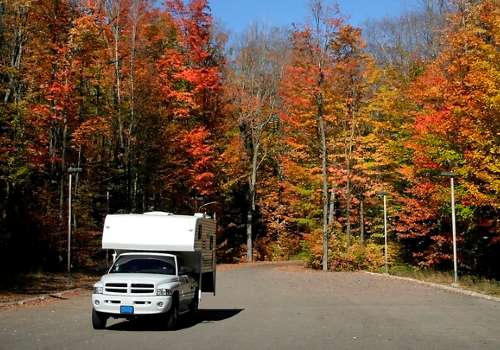
Hard-shell truck campers use corrugated aluminum or fiberglass composite panels for the exterior shell. Top-end versions will have multiple slideouts and high-end travel trailer features. Insulation R-values (the measurement of how well insulation retains heat) will be higher than soft-shells.
Soft-Shell Truck Camper
When we refer to a truck camper shell being a soft-shell, we mean that the sidewall’s upper part has a fabric material. These units are pop-up truck campers that have expandable roofs. They are generally lightweight truck campers and typically won’t have slideouts.
Flat-Bed Truck Camper
Flat-bed versions can either be rigid or soft-shell. The difference is at the bottom of the coach. Since there is more space to work with, flat-bed truck campers have wider bases giving you more interior space, exterior storage space, and side entry doors.
Chassis Mount Truck Camper
Some truck camper manufacturers produce chassis mounted units. You either buy the truck through them or bring your vehicle to their location. During the building process, the company removes the truck’s bed and permanently installs the camper to the chassis. The camper section is still a separate piece from the driver’s cab, but there is a window to communicate.
Truck Topper Camper
Truck topper campers are relatively new to the RV world. They are a great alternative to tent camping and very affordable. This type of truck camper is essentially an expandable pop-up sleeping section above a truck cap. It allows the truck’s bed to keep its utility space as if you were using a regular fiberglass truck topper.
The sleeping space above gives more features than tents. The fabric walls can be multi-layered for insulation, a house battery in the truck’s bed provides basic power, and setup is quick. The mattresses are at travel trailer quality, so it’s easy to get a good night’s sleep.
Truck Camper Specification Ranges
| QUESTION ABOUT TRUCK CAMPERS | ANSWER |
| Lengths | 7.2- 20.4 feet |
| Sleep | 2-6 people |
| Dry Weight (empty weight of the RV) | 1,070- 3,800 lbs |
| Gross Vehicle Weight Rating (a.k.a. GVWR- the most weight the RV can safely hold) | 1,903- 4,725 lbs |
| Price | $9,900- $82,499 |
Ideal Tow Vehicles
Truck campers are based on a pickup truck’s payload capacity. What a truck can hold in its bed and what it can tow are two different things. You also want to look at the center of gravity on the camper. This measurement shows you where that point is from the back and/or front of the pickup’s bed. Check out our article on weight factors for further details.
| MODEL | TOW CAPACITY |
| Toyota Tundra | 1,730 lbs |
| Chevrolet 1500 Silverado | 2,280 lbs |
| Nissan Titan XD | 2,523 lbs |
| GMC 2500 Sierra | 3,541 lbs |
| Dodge Ram 3500 | 4,644 lbs |
| Ford F-350 | 7,033 lbs |
Popular RV Manufacturers of Truck Camper
| BRAND | MANUFACTURER |
| Adventurer | Independent |
| Alaskan Camper | Independent |
| Bigfoot | Independent |
| Bigfoot | Independent |
| Capri Camper | Independent |
| Eagle Cap | Independent |
| Four Wheel Campers | Independent |
| Hallmark RV | Independent |
| Host Campers | Independent |
| Lance | REV Group |
| Northern Lite | Independent |
| Northstar Camper | Independent |
| Northwood RV | Independent |
| nuCamp | Independent |
| Palomino | Forest River Inc. |
| Phoenix Camper | Independent |
| Rugged Mountain | Independent |
| Scout Camper | Independent |
| Travel Lite RV | Independent |
Truck Camper Standard Features Expectations
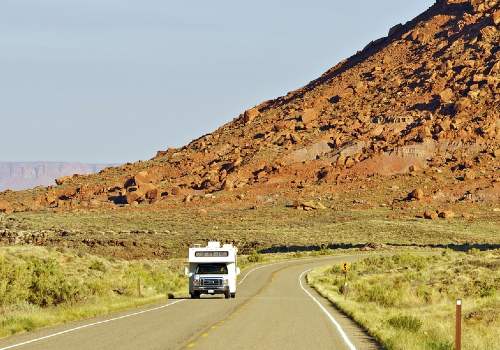
Truck camper features have a different perspective than other RV categories. You won’t see full-sized amenities, but the variation of custom components outmatch any other RVs. The ability to personalize your coach is one of the best features that keep people coming back to them.
Kitchen
Except for the luxury units, the kitchenettes will have the basic amenities. A decent single-basin sink, two-burner cooktop, and microwave. The covering lids on the sink and stovetop add to the counter space when you’re preparing your meals. You’ll find plenty of electrical outlets for portable cooking devices around the kitchenette space.
Living Room
In cabover models, you’ll find a sleeping section in the loft and a general-use space in the main area. The dinette will act as your multi-purpose seating space. Some may have a sofa that either replaces or separate from the dinette. The dinette will be convertible as a single or double sleeper.
Bedroom
Cabover truck camper lofts have mattresses that measure between full-size and queen-size. Many have storage for clothing, personal items, and USB outlets for mobile devices. The mattresses lay on the floor, but manufacturers add insulating layers underneath to protect against cold air seeping in.
Bathroom
Truck campers with bathrooms come in different configurations. Some have hidden cabinets with cassette tank portable toilets. Higher-end versions have wet baths with a combined shower and commode in a water closet. Wet bath models do have holding tanks for couple’s dry camping experiences.
Storage Tanks
Truck campers allow you to camp in remote places wherever your pickup truck can travel. The majority of these units will have fresh and grey water storage tanks. Those with water closets will have a black tank as well.
Truck camper holding tanks for grey and black can range between 15-25 gallons, and freshwater may hold as high as 35 gallons. The holding tanks’ size may seem like a lot, but when you factor in all of your daily routine water usages, the grey water will fill up quickly. Be creative and environmentally safe when using your water to extend time on your tanks.
Storage
RV manufacturers are like poets when it comes to using space. Where poets make sure every word counts, RV designers maximize every square inch. That’s why you’ll find storage within various features and in weird places.
Most of the storage will be inside the coach. In the past few years, manufacturers are finding ways to insert exterior bays into the RV. Smart packing and a minimal lifestyle will serve you well with a truck camper. If you need extra storage, using a hitch-mounted cargo carrier can add storage space but may get in the way of your rear entrance door.
Power and Propane
Propane tanks are now mounted inside an exterior bay. They power the furnace, cooktop, refrigerator, and have plumbed lines for external cooking devices like barbecues. Truck campers use either 20 or 30-pound tanks that are exchangeable at your local store, so you don’t have to deal with refilling them yourself.
Modern truck campers come with a single or dual house battery. Virtually all of them are pre-wired for solar panel systems. They have ports to plug in portable panels, or you can mount them on the reinforced roof. Except for the luxury models, truck campers run 30 amp systems. We always recommend researching how solar panel systems work before buying one.
Technology
While the interior is more contained, RV makers make the most of it. The multimedia system will have internal and exterior speakers as well as an LED TV that’s on a rotatable arm. Ambient LED lighting defuses the brightness, giving you the perfect level of light.
Most of the independent truck camper companies build their units per customer order instead of mass production. Customers can choose from many different leather or fabric patterns, wood choices, laminates, and other interior designs making their RV uniquely theirs.
Climate Control
Want to Connect With a Community of Over 1,078 RV Enthusiasts?
Basic models will come with roof fans with the option to include a furnace and air conditioner. More expensive versions will first include the furnace as a standard feature before the A/C. RV dealerships may order the units with the optional A/C from the factory since they are a popular feature.
Great Examples of Truck Camper
| The Lightest Truck Camper | Travel Lite Rayzer |
| The Best Truck Camper for a half-ton truck | Alaskan Camper 6.5 Cabover |
| The Best Short Bed Truck Camper | Host Campers Tahoe |
| The Best Standard Bed Truck Camper | Palomino Backpack HS-8801 |
| The Best Long Bed Truck Camper | Lance 1172 |
| The Best Pop-Up Truck Camper | Four Wheel Pop-Up Campers Grandby |
| The Best Luxury Truck Camper | Eagle Cap 1200 |
| The Best Truck Camper for Full-Time Living | Northstar 12 STC |
| The Best 4 Season Truck Campe | Northern Lite 8-11EX Special Edition |
Matching to Your Camping Style
The camping lifestyle in a truck camper is different from other towables due to their design. Yet they can go places most can’t. Here are some considerations to mull over if you are thinking about getting into this style of camping.
Positive Truck Camper Reviews and Ratings
The most apparent favorable consideration of a truck camper is its ability to travel. As a hauled coach, you don’t have to worry about hitch issues or other travel concerns like other towables. If your pickup truck can climb through a particular terrain, your truck camper is right there with you sitting in your truck’s bed.
The majority of U.S. States don’t consider them vehicles either. You will receive paperwork from your RV dealer. Only nine states require a title for truck campers. States consider truck campers as hauled “cargo.” Legally, you don’t need a license plate or insurance for them. We recommend buying RV insurance for your camper because your vehicle coverage won’t fully cover your RV.
Many states also allow passengers to ride in the truck camper while traveling. Generally, passengers must have the ability to communicate with the driver. That’s why there’s a window that matches up to the rear driver cab. If you do this, do some homework on all of the states you’ll pass through, so you’re on the right side of the law while traveling.
As we’ve discussed above, truck campers are great for boondocking. As the category has evolved, many buyers have purchased their units because of the ease-of-use in dry camping conditions. Many Millenials are looking for an alternative to the #VanLife choose truck campers for the feature differences and more affordable category entry.
If you’re going to a U.S. public park, don’t worry about the average length limits of a national park campsite. The average length is 30 feet, but smaller ones cut off around 20 feet. Very few truck campers measure past 12 feet in length. If you want to disconnect, all it takes is dropping your jacks, unhooking your straps, and connecting your shore hookups.
Is A Truck Camper Worth It?
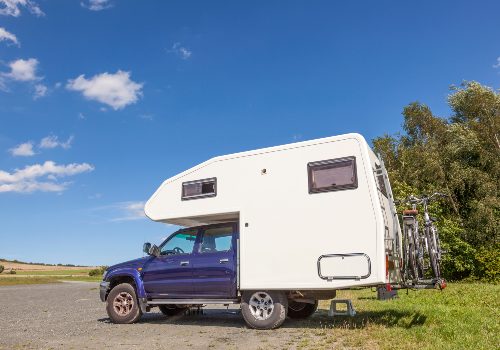
The truck camper lifestyle isn’t for everyone. While the large luxury versions have full-size travel trailer features to enjoy the interior space, most campers aren’t going to have an overly spacious feel that you get from other towable categories. Ideally, couples that enjoy the outdoors or activities outside the RV will find truck campers a better fit.
Glamping in a truck camper has to do with making the most out of the features and space. An example would be buying your camper through an independent company that lets the customer customize the materials and floorplan.
The fabric, flooring, and wood materials could have complimenting tones that appeal to your tastes. The specific model you buy lets you pick between a wet bath or a dry bath. You could also upgrade various other features. What won’t change is the size of the kitchenette, dinette, and other core components.
Your choice of vehicle is limited to full-size trucks. The difference between half-ton and heavy-duty trucks is increasing every year as automakers make half-tons more fuel-efficient and tweak them for the general population. Still, for RV purposes, you need power.
Using a three-quarter or one-ton truck with a standard or long bed will open the door to the most choices possible if you’re looking to camp on longer trips or become a full-timer. The average fuel-efficiency for heavy-duty trucks like the Ford F-250 or the Chevrolet Silverado 3500 is 10-15 MPG.
The Next Step
We’ve given you a lot to consider. The next step in your RV research should be renting one to gain firsthand knowledge. While truck campers are at the less expensive end of the RV price spectrum, they’re still a significant investment. Trying them before you head to the dealership will give you the practical experience you need to make up your mind.
Using a peer-to-peer rental company like Outdoorsy or RVshare lets you find the RV you’re looking for in your area. Real people, not corporate entities, own these units. You’ll get to experience what the coach is like, use the features, and gain insight from the RV owners themselves as they walk you through the truck camper.
We recommend trying different brands with different floorplans to maximize the experience. Try out the big names (Lance and Palimino) as well as some of the top-rated independents.
As you’re renting, continue to read through the RVTroop website to learn more about the various brands and models. We’ll feature unbiased walkthroughs of many brands from RV experts and consumer feedback. Many of our readers stay with us to continue to learn valuable camping techniques from long-time veteran campers.
When you’re ready to buy, you’ll have the practical experience, expert knowledge, and veteran tips to save you thousands of dollars.
Welcome to the RV Lifestyle!
"Man cannot discover new oceans unless he has the courage to lose sight of the shore."
-- Andre Gide

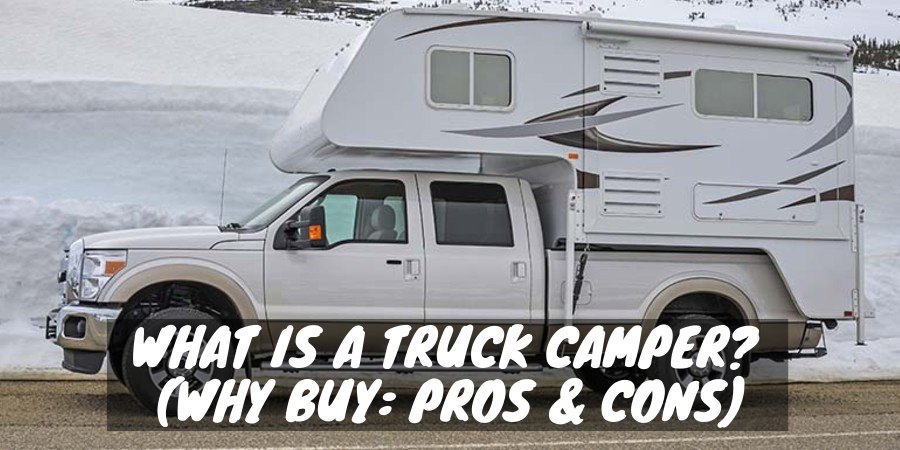
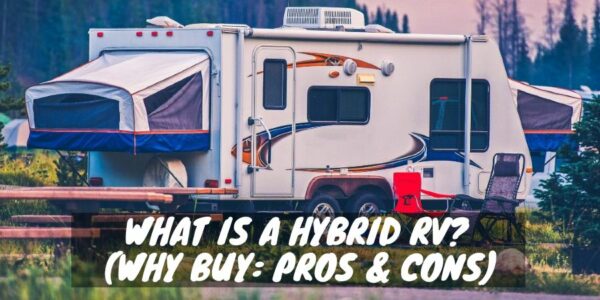
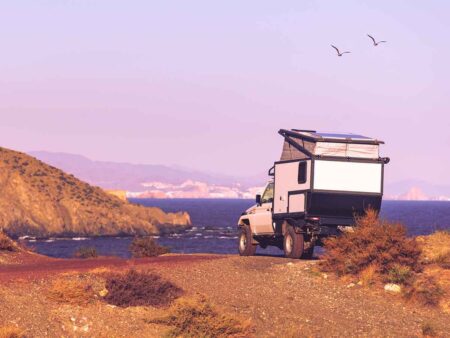

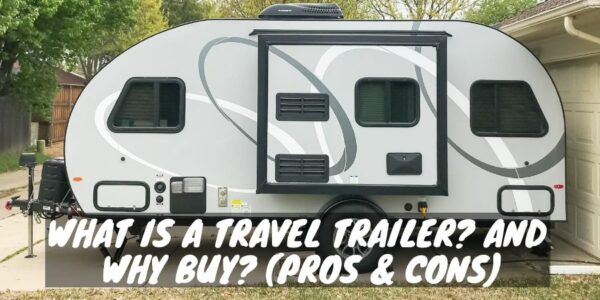
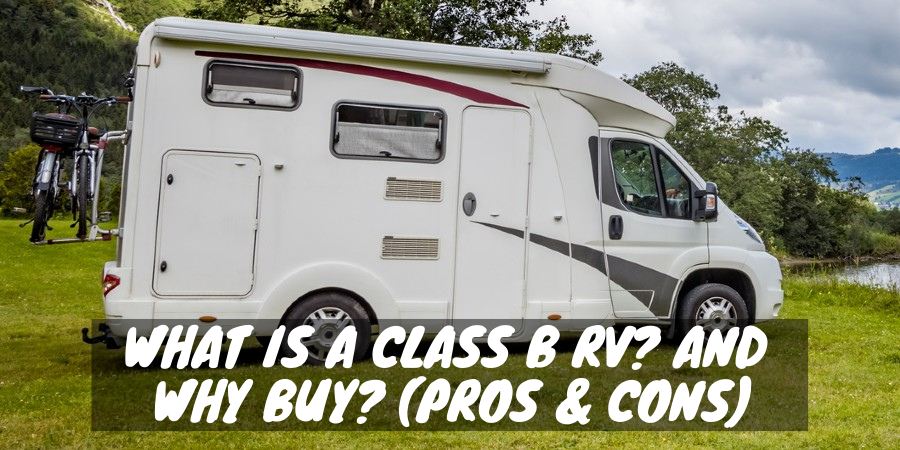


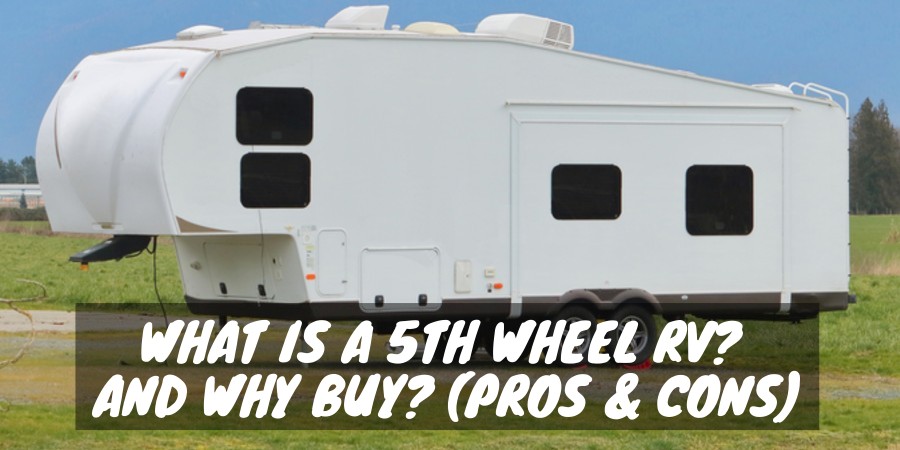
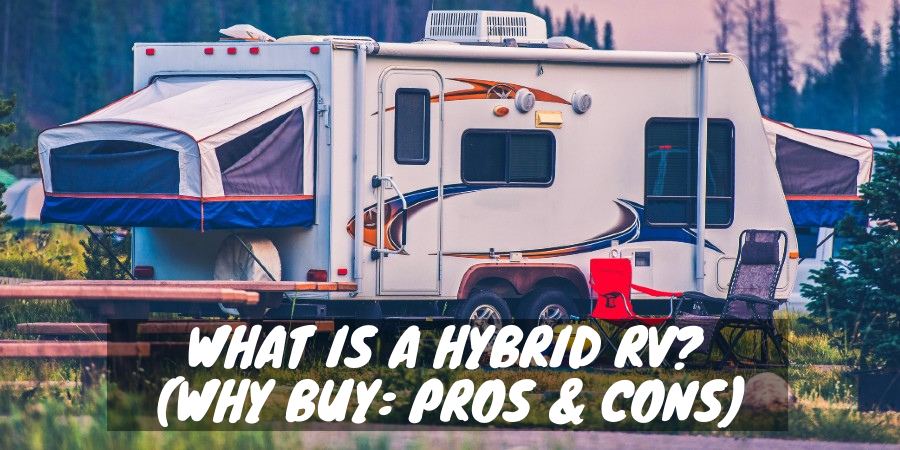
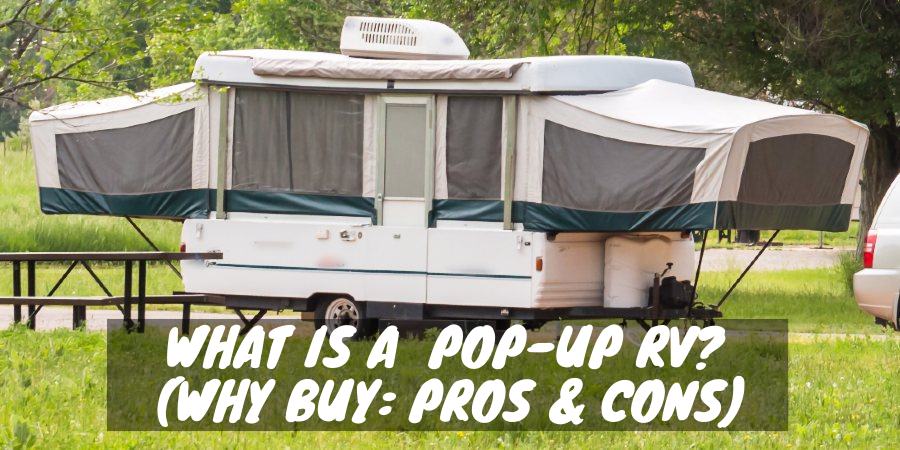
aaaaaaaaaaa
I’m surprised that you talked about and supplied tow ratings for truck, and barely mentioned payload capacity.